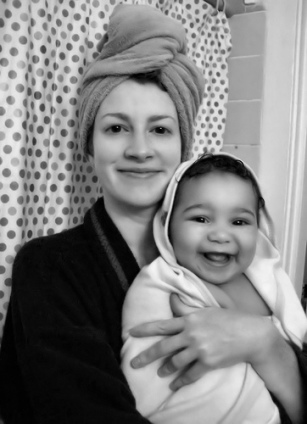
Your Baby's Developmental Tasks:
- Rapid physical and brain development in response to environment.
- Development of receptive & expressive language.
- Development of ability to self-soothe.
- Development of capacity for trust & intimacy.
Your Parenting Challenge:
Now that you don't have a brand new baby, you expect yourself to pull your life together and get a grip. NOT likely. And, really, not necessary. Your baby will only be a baby once.
Your Parenting Priorities:
Setting up work schedules so that you maximize parental time with Baby and minimize non-parental care.
Parents' Game Plan:
1. Get some sleep.
By 12 months, many pediatricians recommend no more night nursings, because you risk giving your baby cavities. It can be a challenge to teach your baby to go back to sleep without nursing. Check out the sleep pages on this site.
2. Baby-proof and redirect.
As your infant becomes a baby and starts exploring, remember that saying No all the time will cause NO to lose its power. There's also research that too many No's lower IQ by teaching your child to think inside the box. Instead, Baby-proof, Think two steps ahead, and Redirect!!
3. Nurse as long as you can, certainly for at least a year.
The health and intelligence effects are greater the longer the baby nurses. Not to mention that it lowers the mom’s risk of cancer later in life. The positive health effects of breast milk are diminished the minute you introduce formula, so nurse more to increase your milk supply instead of supplementing.
4. Minimize spoon feeding.
The less time you feed your baby with a spoon, the better. You want to avoid being in the position of pushing a spoon into your kid’s mouth, and all the control and power issues around food that arise from this. How? Don't start solids until six months, as recommended by most pediatricians to avoid allergies. By this age, most babies love grabbing very soft food like cooked peas, carrots and chunks of sweet potato. In the beginning you may need to feed your baby spoonfuls of cereal, but as soon as she starts grabbing the spoon, it’s better to let her feed herself. It’s messy, but not as messy as an eating disorder at the age of fifteen.
5. If you're working, make sure you stay connected to your baby.
Human babies don't thrive unless they feel connected to mom and dad. Their very brain development depends on it. Be there while your baby is awake as much as you can. Keep your hours and commute as short as possible. And just say No to anything else that vies for your time.
6. If you're home with your baby, make sure you don't get isolated.
Humans thrive in groups. Your baby needs you, but that doesn't mean she won't enjoy getting out and interacting in the world. Join a playgroup, take baby along when you meet your old friend for lunch. And be sure you get some time to yourself.
7. Be present with your baby, and respond to the needs your baby expresses.
Child development researchers agree that the most important factor in your parenting is how responsive you are to your baby. That means that you pay attention, and when your baby cries, you try to comfort them. When your baby wants to be carried, you carry them. When they want to play on the floor, you put them down. Babies who are parented more responsively are more likely to be securely attached. In fact, babies who are parented more responsively actually have different brains than babies who are parented less responsively. Their brains are more resilient and adaptable! No, your baby can't have everything he or she wants. But they don't understand why not, so your goal, as much as possible, is to respond to what your baby is expressing.
8. Enjoy your baby. Enjoy your partner. Enjoy yourself.
Your child will be in school before you know it, and all you'll have left of this precious time will be the memories you're building right now. The only thing we ever really have is Now. With a baby, NOW can seem endless. Take care of yourself so you can enjoy this time with your baby!





